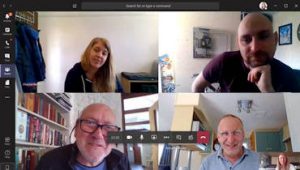Early in the development of this pandemic, VGC’s senior management team identified that mental health would become a significant element.
With this in mind, we ensured all our response plans incorporated mental health and wellbeing. This is a critical and fundamental consideration for any action we put in place.
Changes in our everyday environment
All of us have been greatly affected by changes in our normal working routine and in our everyday environment.
Some employees have had to be furloughed. That has resulted in an immediate change from working perhaps five or six days a week, to being in a situation where they have nothing to do.
Some have moved from being in a busy office to immediately having to make an office within their home. That was along with their partner wanting to do the same. In some cases, they have had to adapt to becoming a home schooling tutor as well, competent in all subjects within the educational curriculum.

Others who were able to stay on site suddenly found the only way to travel to work was by their own vehicle. Any engagement with colleagues had to be done with the two metre rule in force.
Whatever our circumstances, one thing we all had in common was it was significantly different to just a week or two beforehand. Also, it is likely to remain so, in one way or another, for some time yet.
The new normal
What may have been looked upon as unusual and perhaps even taboo was, within a matter of days, the new normal – such as:
- I’m working from home today.”
- “The meeting will be by video.”
- Greeting a friend, but not been able to hug or shake hands. Instead staying two metres apart.
Indeed, working in an office with others, attending meetings in person, hugging a friend, being within two metres of each other, were suddenly taboo.
Technology that existed but was expected not to become commonplace until two to five years’ time, suddenly – within two to five days – became the new normal.
How many of us felt isolated and alone, not to mention stupid, when we woke up at 5am to get ready for work on Monday – then remembered we were on furlough? Or given a Microsoft Teams invite, stared at it thinking “so where is the button to press to join?” Or even thought the station seemed quiet. Then realised the 06:45 train to London was cancelled and the next one was “to be confirmed”, and were left wondering “Well, how do I get to work now?”
A strange and unnerving situation
Whatever situation above we found ourselves in, it was strange and unnerving, where dark thoughts and doubts could creep in.
For some, these were compounded by family members who were ill. Was it coronavirus or just a cold? What about those whose family members were in the line of fire? A family member of mine is a paramedic, and I cannot imagine how they feel attending work, not knowing if that’s the day they will become ill.
We all have had to go through some significant changes, and adapt to the new normal. We queue outside shops for basics, and then see if there is anything left.
What is a priority
We have changed our thoughts on what is a priority – and what isn’t. Before, when we asked someone if they were OK, we were actually put out if we didn’t get the expected answer of “Fine thanks, and you?”
Now there is real thought and meaning behind the question, and we expect an honest answer.
“Scared actually, what about you?”
“Yeah the same”
“How is the family?”
“OK but we are arguing over little things. They are not used to me being there all day, and taking over the table as my office.”

Sharing and talking
We need to ask for support more. We should tell someone if we are finding things strange or difficult. We need to say if we’re struggling or feeling completely overwhelmed. Nobody can resolve it all for us, but by sharing and talking you can see you are not an individual all alone.
At VGC Group, we have always worked to support our people. Our mental health team can signpost you to help, financial guidance and advice.
If you feel you need support, speak with someone. A friend, a family member, a line manager, an outside organisation; it doesn’t really matter who, as long as you speak with someone. See the list of support organisations on our website.
Within my team, we have a video catch-up, with a quiz, every Thursday at 12:30 without fail. Whether furloughed, working from home, out on site or in an office, it doesn’t matter, so long as you have a cup of coffee or tea – and don’t talk about work. These little things allow us to remain together, no matter what our circumstances, and allow us to see how each other is coping.
We are a team, we remain a team, and we will stay a team, by ensuring we talk to each other.
Try the HSQE quiz
- Download Richard’s HSQE quiz (135kb pdf)
Congratulations to Fiona Dowling and Terry Dutton Wells who were joint winners with 8 points each. Download the answers (30kb pdf)
- Download Ben’s HSQE quiz (39kb pdf)
Richard won with 12 points – did you beat him? Check your answers to Ben’s quiz (57kb pdf)
- Download Chantal’s 11 June HSQE quiz (162kb pdf)
Another win for Richard, again with 12 points. He says that some of his answers were just lucky guesses. Download the answers (29kb pdf) and compare your score to his.
- Download Richard’s 18 June quiz (262kb pdf)
Terry won with 9 / 15. Download the answers (263kb pdf).
Let us know in the comments what your score was!

